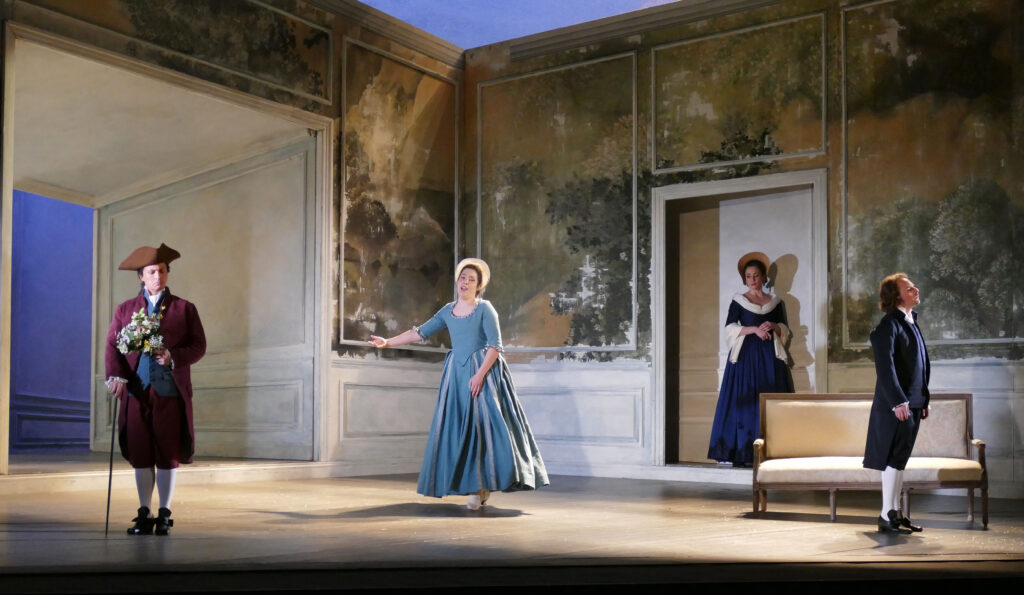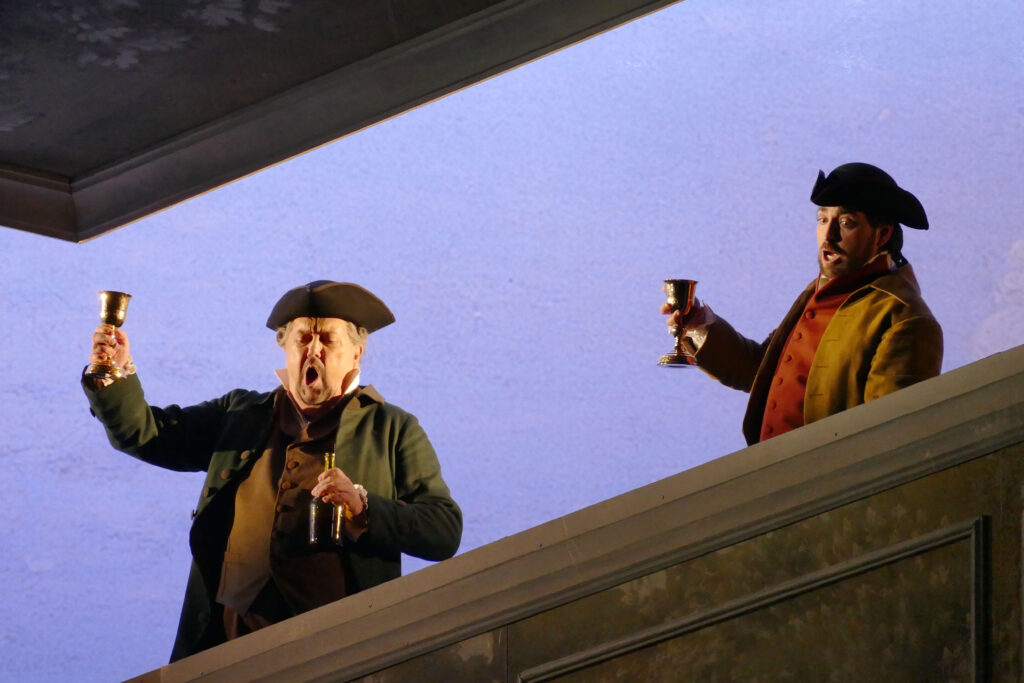The Opéra de Marseille assembled a fine cast to perform the Massenet masterpiece in a prize winning production from Nancy.
Bordeaux tenor Thomas Bettinger poured his heart out as the poet Werther. His is an ideal voice for the French lyric repertory, flowing evenly through the register, achieving the climatic notes with grace and ease. His Werther does not want for passion, in Marseille his arias fairly exploded with the pleas that his love be requited. Strasbourg born, Lausanne finished mezzo soprano Antoinette Dennefeld suffered, with Massenet, mightily in the heroic struggles of her third act dilemmas, her voice fulfilling easily and forcefully the mid-voice demands of the role. Mme. Dennefeld sang the fourth act (death of Werther) wonderfully full voiced to Werther ’s mezza voce, choked utterances — we ached to experience his agony in full tenor vocal regalia. (photo above).
Drôme born, Avignon finished soprano Ludivine Gombert accomplished the soubrette role of Sophie with the customary silvery tones, flirting easily with the spontaneity of youth in its upper registers, projecting the innocence of youth in her bearing. Marseille born, Paris finished baritone Marc Scoffoni sang Albert in a confident, metallic edged voice that identified him as man of purpose and means. These attributes, often associated with this role, precluded us from having sympathy whatsoever for him as he lay weeping downstage while Werther shot himself off stage. Yes, we too were puzzled.

Bass Marc Barrard, a veteran of many roles in many theaters in the south of France, responsibly sang the Bailli (a magistrate), a rebound from the same role last month in Monte-Carlo. Of special note were the eight children from the Maitrise des Bouches-du-Rhone Choeur d’Enfants who sang their role with unusual perfection. Never mind that this number makes the Bailli’s dead wife the mother of ten children (including Charlotte and Sophie).
The production originated at the Opéra national de Lorraine in 2018. It was conceived by British stage director Bruno Ravella (though born in France) and his British designer Leslie Travers. The production won the 2019 Prix de la critique Claude Rostand (a syndicate of professional French critics) for the best regional production, i.e. taking place outside Paris.
The design of the production is highly stylized, the first act was in an oversized entry room (no furniture) with painted walls à la nineteenth century provincial French decor. They were distressed, who knows why. The ceiling magically lifted itself high up — deus ex machina! — to reveal a forest during Werther’s “O Nature, pleine de grâce” (tenor Bettinger however was not yet sufficiently warmed up to warrant this big, or in fact any scenic trick). A while later in his declaration of love to Charlotte the ceiling, now covered with pinpoint stars, descended into the room.
The second act was set in the same room, this time the roof had been uniformly raised to reveal a blue line of cloudless sky at which elevation Schmidt and Johann’s torsos did their drinking scene. Down below folks passed through on their way to and from church, and the story got quite a bit more complicated as they encountered one another.

The third act was a flat, floridly painted wall, with a geometric intestine in its center through which the opera’s protagonists passed — the first act room had the same intestinal conceit of which the production took advantage to bathe in pure white light at moments it found significant. Charlotte accompanied Sophie’s “Ah! le rire est béni” sitting at a barely visible, abstracted black harpsichord shape. The pistols to give to Werther were at the ready on Charlotte’s table, who knows why. The hole in the wall was closed. Albert wept.
The wall rose onto a blank stage for Werther’s death, save a massive upstage snow fall, magnificently lighted to be sure (lighting is credited to Malcom Reppeth), and a lone sofa on which sat Werther at one end. Charlotte entered and sat at the other end. The snowfall stopped, Werther expired.
So much for the intimacy of love.
All of this might have worked (or been made inconsequential) had the Orchestre de l’Opéra de Marseille realized Massenet’s tragedy in the pit. Conductor Victorian Vanoosten, a former assistant conductor at the Marseille Opera, stood high above his orchestra thus assuming considerable presence in the theater — we noted his florid conducting style. While he did find the lyricism of Massenet’s masterpiece it followed the emotional moment instead of creating the emotional moment. There was constant, pervasive, inherent dramatic stasis.
This made for a very long evening, and evoked our great sympathy for the fine cast assembled by the Opéra de Marseille.
Michael Milenski
All photos copyright Christian Dresse, courtesy of the Opéra de Marseille